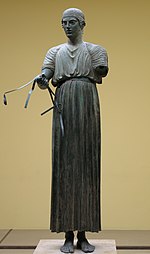Theogony References | Selected translations | Other websites | Navigation menu2326703Hesiod, TheogonyHesiod, TheogonyHesiod, Theogonyeadding to it
Ancient GreeceEpic poems
GreekgodspoemHesiodAncient GreekHomerEpic dialectIlliadOdysseymythologysynthesisGreekmythicalcosmogonychaos
Theogony
Jump to navigation
Jump to search

Ancient bronze bust, known as Pseudo-Seneca. This is now believed to be an imaginative portrait of Hesiod.[1]
The Theogony (Greek: Θεογονία, Theogonía, the birth of the gods) is a poem by Hesiod. It was written in the 8th or 7th century BC, and uses the same dialect of Ancient Greek as Homer. This dialect is known as Epic dialect today. With the exception of the Illiad and the Odyssey, the Theogony is the oldest known source of Greek mythology.
The poem is a synthesis of different Greek stories and traditions. It is a story that tells how the gods came to be and how they established permanent control over the cosmos. It is the first Greek mythical cosmogony. In the beginning, the state of the universe is chaos - a dark indefinite void. Everything else appeared from divine chaos.
References |
↑ Erika Simon (1975). Pergamon und Hesiod (in German). Mainz am Rhein: Philipp von Zabern. OCLC 2326703..mw-parser-output cite.citationfont-style:inherit.mw-parser-output .citation qquotes:"""""""'""'".mw-parser-output .citation .cs1-lock-free abackground:url("//upload.wikimedia.org/wikipedia/commons/thumb/6/65/Lock-green.svg/9px-Lock-green.svg.png")no-repeat;background-position:right .1em center.mw-parser-output .citation .cs1-lock-limited a,.mw-parser-output .citation .cs1-lock-registration abackground:url("//upload.wikimedia.org/wikipedia/commons/thumb/d/d6/Lock-gray-alt-2.svg/9px-Lock-gray-alt-2.svg.png")no-repeat;background-position:right .1em center.mw-parser-output .citation .cs1-lock-subscription abackground:url("//upload.wikimedia.org/wikipedia/commons/thumb/a/aa/Lock-red-alt-2.svg/9px-Lock-red-alt-2.svg.png")no-repeat;background-position:right .1em center.mw-parser-output .cs1-subscription,.mw-parser-output .cs1-registrationcolor:#555.mw-parser-output .cs1-subscription span,.mw-parser-output .cs1-registration spanborder-bottom:1px dotted;cursor:help.mw-parser-output .cs1-ws-icon abackground:url("//upload.wikimedia.org/wikipedia/commons/thumb/4/4c/Wikisource-logo.svg/12px-Wikisource-logo.svg.png")no-repeat;background-position:right .1em center.mw-parser-output code.cs1-codecolor:inherit;background:inherit;border:inherit;padding:inherit.mw-parser-output .cs1-hidden-errordisplay:none;font-size:100%.mw-parser-output .cs1-visible-errorfont-size:100%.mw-parser-output .cs1-maintdisplay:none;color:#33aa33;margin-left:0.3em.mw-parser-output .cs1-subscription,.mw-parser-output .cs1-registration,.mw-parser-output .cs1-formatfont-size:95%.mw-parser-output .cs1-kern-left,.mw-parser-output .cs1-kern-wl-leftpadding-left:0.2em.mw-parser-output .cs1-kern-right,.mw-parser-output .cs1-kern-wl-rightpadding-right:0.2em
Selected translations |
| Greek Wikisource has original writing related to this article: Theogony (Greek) |
Wikisource has original writing related to this article: Theogony |
Athanassakis, Apostolos N., Theogony ; Works and days ; Shield / Hesiod ; introduction, translation, and notes, Baltimore: Johns Hopkins University Press, 1983.
ISBN 0801829984- Frazer, R.M. (Richard McIlwaine), The Poems of Hesiod, Norman : University of Oklahoma Press, 1983.
ISBN 0806118377 - Most, Glenn, translator, Hesiod, 2 vols., Loeb Classical Library, Cambridge, Massachusetts, 2006-07.
- Schlegel, Catherine M., and Henry Weinfield, translators, Theogony and Works and Days, Ann Arbor, Michigan, 2006
Other websites |
Hesiod, Theogony e-text (in English)
Hesiod, Theogony e-text in Ancient Greek (from Perseus)
Hesiod, Theogony e-text in English (from Perseus)
Categories:
- Ancient Greece
- Epic poems
(RLQ=window.RLQ||[]).push(function()mw.config.set("wgPageParseReport":"limitreport":"cputime":"0.444","walltime":"0.610","ppvisitednodes":"value":856,"limit":1000000,"ppgeneratednodes":"value":0,"limit":1500000,"postexpandincludesize":"value":27558,"limit":2097152,"templateargumentsize":"value":1449,"limit":2097152,"expansiondepth":"value":13,"limit":40,"expensivefunctioncount":"value":2,"limit":500,"unstrip-depth":"value":1,"limit":20,"unstrip-size":"value":6533,"limit":5000000,"entityaccesscount":"value":1,"limit":400,"timingprofile":["100.00% 528.374 1 -total"," 40.35% 213.180 1 Template:Reflist"," 37.56% 198.447 1 Template:Lang-el"," 37.20% 196.567 1 Template:Cite_book"," 9.79% 51.707 2 Template:ISBN"," 5.89% 31.111 2 Template:Sister"," 5.14% 27.167 2 Template:Side_box"," 4.11% 21.690 1 Template:Wikisourcelang"," 3.85% 20.361 1 Template:Ancient_Greece:_Arts_and_Culture"," 3.66% 19.332 2 Template:Catalog_lookup_link"],"scribunto":"limitreport-timeusage":"value":"0.288","limit":"10.000","limitreport-memusage":"value":11359547,"limit":52428800,"cachereport":"origin":"mw1338","timestamp":"20190617160243","ttl":2592000,"transientcontent":false););"@context":"https://schema.org","@type":"Article","name":"Theogony","url":"https://simple.wikipedia.org/wiki/Theogony","sameAs":"http://www.wikidata.org/entity/Q156498","mainEntity":"http://www.wikidata.org/entity/Q156498","author":"@type":"Organization","name":"Contributors to Wikimedia projects","publisher":"@type":"Organization","name":"Wikimedia Foundation, Inc.","logo":"@type":"ImageObject","url":"https://www.wikimedia.org/static/images/wmf-hor-googpub.png","datePublished":"2011-01-27T22:53:44Z","dateModified":"2018-06-28T01:06:07Z","image":"https://upload.wikimedia.org/wikipedia/commons/3/36/Seneca.JPG","headline":"poem by Hesiod"(RLQ=window.RLQ||[]).push(function()mw.config.set("wgBackendResponseTime":113,"wgHostname":"mw1265"););
